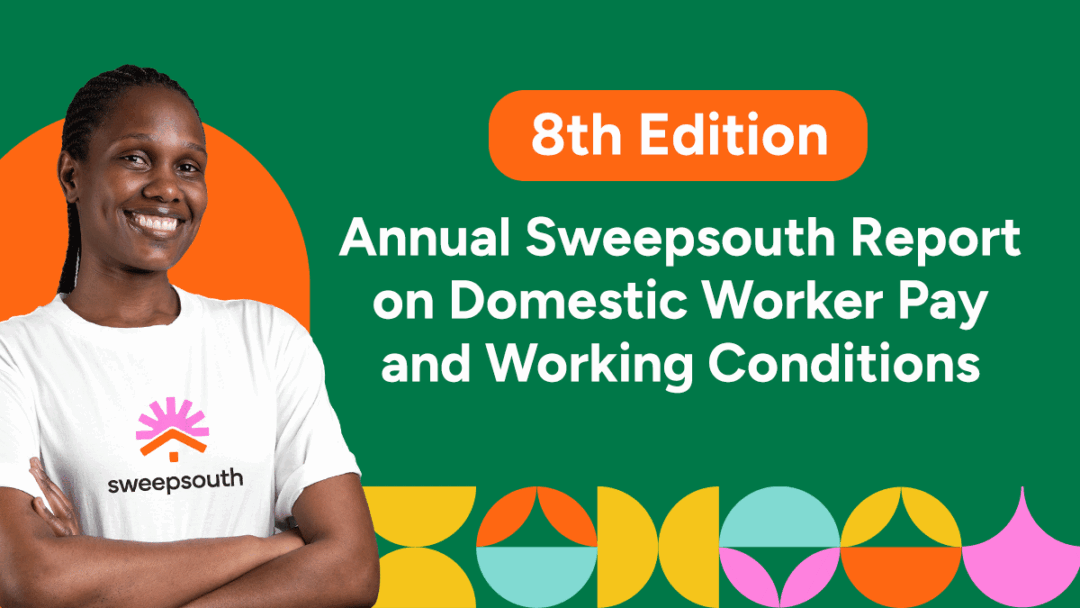The 8th Annual Sweepsouth Report on Domestic Worker Pay and Working Conditions provides significant insight into the realities of the people who keep our homes running well.
Over 5,000 domestic workers from across South Africa shared their stories. The accumulated results bring their current experiences into the spotlight. While this year’s report tells of stories of hardship and struggle, it also carries a glimmer of hope for a better tomorrow.
Let’s dive into the statistics:
- The average domestic worker is 38 years old, and 92% of them are women.
- 82% are breadwinners, often the sole provider, with 64% raising children as single parents.
- On average, each worker supports nearly four dependents.
- 43% have finished high school, 18% studied further, 39% are currently enrolled in courses, and 86% say they would study if they could.
- 72% don’t earn enough to save, and a third are in debt.
- 16% of women and 11% of men report negative mental health.
- Among former domestic workers, 26% have formal training in elderly care.

While domestic work continues to offer income opportunities for many households, workers remain under immense strain. Rising living costs, unemployment, and financial instability are the most pressing challenges, with 39% still earning below the national minimum wage and 72% unable to save each month. Many juggle multiple employers to make ends meet, often supporting up to four dependents on a single income. With mental health concerns, financial pressures and family challenges on the rise, many are left without adequate support.
Despite these struggles, resilience and ambition shine through. A remarkable 86% of workers expressed a desire to further their education if resources were available, while some have transitioned into new opportunities such as elderly care, where workers report both greater enjoyment and improved pay.
The report also highlights the impact of broader national shifts. Improvements in power stability since the peak of loadshedding in 2023 have created steadier working conditions, yet persistent unemployment and inflation continue to erode earnings. At Sweepsouth, we remain committed to turning these insights into action.
Over the past year, we have:
- Expanded earning opportunities through new services, B2B partnerships, and permanent employment connections.
- Raised platform pricing and continued to drive fair pay, with 100% of customers paying well above minimum wage and 100% of tips going directly to the SweepStar.
- Introduced innovative features like express bookings and improved matching algorithms to boost earning potential.
- Reduced cost-of-living pressures with rewards programmes and brand partnerships.
- Raised awareness around the importance of living wages and better protections for domestic workers.
“Even in the face of hardship, a powerful theme emerges: the will to learn. Domestic workers continue striving for education, proving their determination to grow beyond circumstance.” – Lourandi Kriel, Sweepsouth CEO
The findings are clear: while progress has been made, more must be done to build an equitable and sustainable domestic work sector. By combining data, advocacy, and innovation, we can ensure domestic workers receive the dignity, security, and opportunities they deserve.
DOWNLOAD OR VIEW THE FULL REPORT BELOW:
https://sweepsouth.com/wp-content/uploads/2025/09/2025_DomesticWorkerReportV3.pdf
DOWNLOAD OR VIEW THE REPORT ADDENDUM BELOW:
https://sweepsouth.com/wp-content/uploads/2025/09/2025_DomesticWorkerReport_Addendum.pdf
ALSO SEE: 7th Annual Sweepsouth Report on Domestic Worker & Working Condition.









